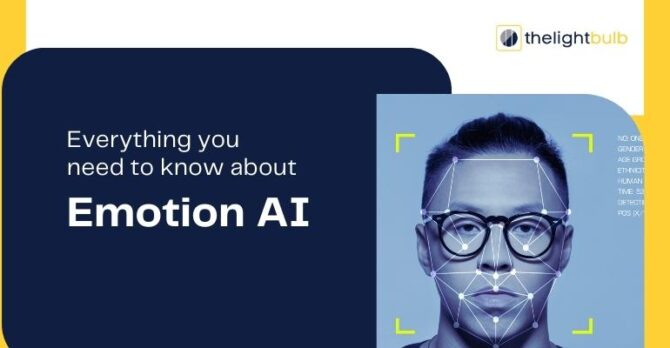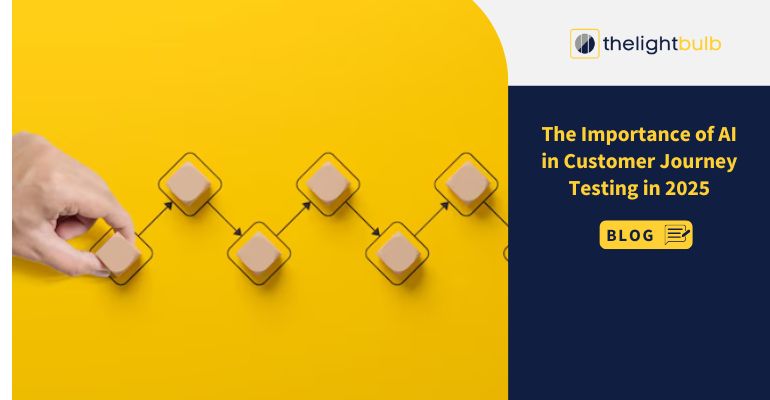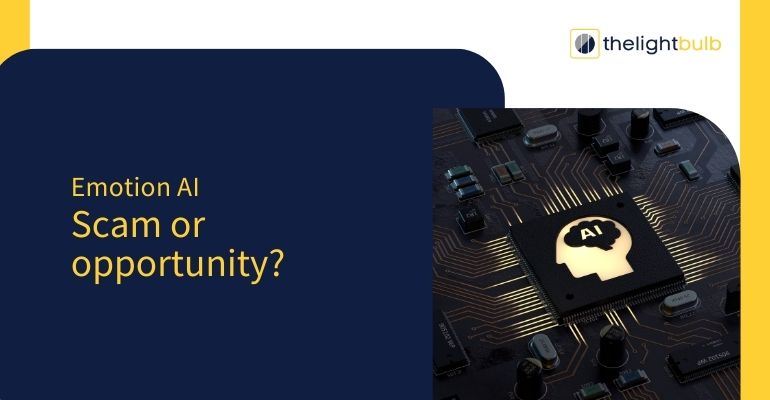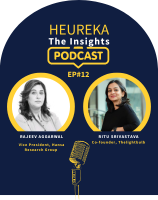
Ever since John McCarthy and Marvin Minsky founded Artificial Intelligence in 1956, it has evolved. People were amazed that it could solve puzzles(quickly) in the 60s, and now we have AI models that can predict whether. A task that nobody thought was possible, let alone through AI. And all of this is the result of countless experiments, iterations, and relentless efforts from AI proponents, one such iteration being Emotion AI.
Emotion-AI draws its roots from way back in 1995 when MIT professor and researcher Rosalind Picard published a paper titled “Affective Computing” discussing the role of AI in recognizing, processing, and reporting human emotions. Emotion AI has been validated as a concept and we recognize its potential to revolutionize the world and everything in it.
That’s why we decided to make people more aware of the concept through this primer. By the time you complete reading this extract, you will be conscious of the concept and its potential in the real world. We have also tried to address any intuitive questions that might come to your mind while reading this.
So let’s start with the basics.
Why do we need Emotion AI?
There are quite a few reasons why we need Emotion AI–
1. Emotion AI has practical use cases
For instance, to optimize their interactive subway ads, Brazil’s Yellow Line of the Sao Paulo Metro implemented AdMobilize’s Emotion AI analytics technology. This software, integrated into security cameras, uses face metrics like gender, age, gaze duration, attention span, and emotion to gauge the effectiveness of the advertisements.
2. Emotional Intelligence is a key component of intelligent machines
Here’s a thought experiment. Think of two individuals, one who is very receptive to your emotions and responds appropriately to them. And another who doesn’t care about your emotions and barely even acknowledges them. Who would you engage with?
It’s a no-brainer, right? Because people with higher emotional intelligence are more likable, and therefore more persuasive. The intelligence of any form is expected to accommodate emotional intelligence, especially when humans are at one end of the interaction.
3. Emotion AI facilitates ethical decision making
Human beings act ethically and within boundaries, and even if we don’t, the social constructs correct us and compel us to act ethically. If we expect AI models and neural networks to acknowledge these boundaries and operate within them, emotional intelligence is a prerequisite.
Only When AI models are familiar with a universal set of emotions and can identify and differentiate between positive and negative ones, can they truly act within those boundaries? Otherwise, who is to stop them from doing something entirely inappropriate? They have no sense of morality, AI needs some boundary conditions to be able to stay within the confines of ethical moral constructs.
Where is Emotion AI used?
Annette Zimmerman, Research Vice President at Gartner said in an interview: “We will continue to find many new and exciting uses for Emotion AI technology over the coming year, however, smaller providers will need to focus their efforts on a limited number of applications and industries, instead of trying to be everything to everyone.”
Emotion AI has a multitude of real-world applications and the potential for countless more. Here are some of the important ones:
- Marketing and Advertising- A huge part of marketing and advertising is understanding the perception and emotions of the audience. Emotion AI offers a gateway into the emotional profile of the audience. This helps them in personalizing the customer experience and create more effective marketing campaigns. AI for advertising is already creating a big buzz in the industry.
- Medical Diagnosis- Certain mental health problems are associated with emotion groups that are identified using emotionally intelligent software and facilitate early diagnosis of the condition and help doctors take pre-emptive measures to prevent more severe symptoms.
- Academic and Industrial Research- Research across domains leverages tools like surveys, interviews, focus groups, and group discussions to uncover hidden insights. Emotion AI can make these processes more efficient by improving the quality of insights, and by incorporating emotional intelligence in the data. We already have a detailed extract on how Emotion AI can assist in research projects that you can read for a better understanding of this use case.
- Sales- Sales processes are all about understanding the needs of the prospect and then following up on them to push them further into the sales funnel. However, the pandemic has shifted everything online including sales meetings. Emotion AI offers sales enablement tool that can uncover points that elicit positive reactions from the prospect and give sales reps solid pointers to follow up on. We have a detailed extract on how Emotion AI can assist sales representatives that you can read for a better understanding.
Examples of Emotion AI
Emotion AI has already been implemented into systems around the world boosting their efficacy. There are claims that the precision of emotion recognition models that are built on facial coding is as high as 96.43%.
Moreover, the adoption of Emotion AI has been rapid, the emotional AI market is forecasted to experience substantial growth in the coming years, rising from a value of $19.5 billion in 2020 to an estimated $37.1 billion by 2026, as reported by Analyticsinsight. This equates to a compound annual growth rate of 11.3% over the forecast period.
Here are some of the real-world use cases of Emotion AI:
- The Henn La Hotel in Ginza, Tokyo checks in guests using an Emotion AI-enabled robot that can mimic human emotions in addition to identifying and reacting to them. The robot welcomes guests as they enter the hotel lobby and takes care of any immediate needs as a receptionist would.
- In 2009, Rana el Kaliouby and Picard established Affectiva, a Boston-based Emotion AI company that focuses on automotive AI and advertising research for a quarter of the Fortune 500 companies.
- Cogito, co-founded by MIT Sloan alumni in 2007, assists call center agents in identifying the moods of phone customers and adjusting their conversation approach in real-time. In December 2018, Cogito launched a spinoff called CompanionMx and a related mental health monitoring app.
- Skyscanner, an AI-based flight booking platform uses Emotion AI to enhance the customer experience when booking flights. Customers can take a picture of themselves and the API will analyze it, displaying the results and offering personalized travel recommendations based on the user’s facial expressions.
Advantages of Emotion AI
- Emotion AI facilitates better decision-making by taking into account emotional insights.
- It boosts the efficacy of systems by making them emotionally conscious.
- It makes processes like marketing, advertising, and sales more efficient by enabling the personalization of campaigns.
- Emotion AI significantly boosts customer experience by proactively identifying and addressing customer concerns.
- Emotion AI can help companies streamline processes and make more informed decisions by analyzing customer emotions in real time.
Limitations of Emotion AI
Being a relatively newer concept, it has some limitations. MIT Sloan professor Erik Brynjolfsson highlights one of the central limitations of Emotion AI, “For instance, recognizing emotions in an African American face sometimes can be difficult for a machine that’s trained on Caucasian faces, and some of the gestures or voice inflections in one culture may mean something very different in a different culture.”
And there’s more-
- These systems operate within the confines of dynamic privacy laws across the world, which makes it difficult to utilize the full potential of the framework.
- The efficacy of the system is contended over, as it works with a limited emotional spectrum.
- Research has discovered that emotional analysis technology tends to identify higher levels of negative emotions in certain ethnic groups compared to others.
Can Emotion AI be better than humans?
This question is best answered by Rana el Kaliouby, a ‘06’ Ph.D. scholar from MIT when he says “The paradigm is not human versus machine — it’s machine augmenting human,” she said. It’s human plus machine.”
And that’s rightly said. The goal of Emotion AI was never to replace human efforts but to assist them. It magnifies human efforts by combining emotional intelligence with the processing powers of computers. And to answer the burning question of whether AI can ever replace humans, the answer is “No”, and We’ll tell you why.
The neurons used to encode neural networks are simple on-off variables, and human neurons are much more complex than an on-off switch, so as long as we stick to the same fundamental primitives, AI can never replace humans.











